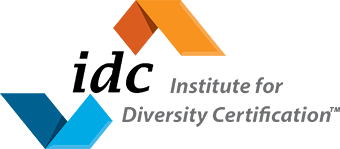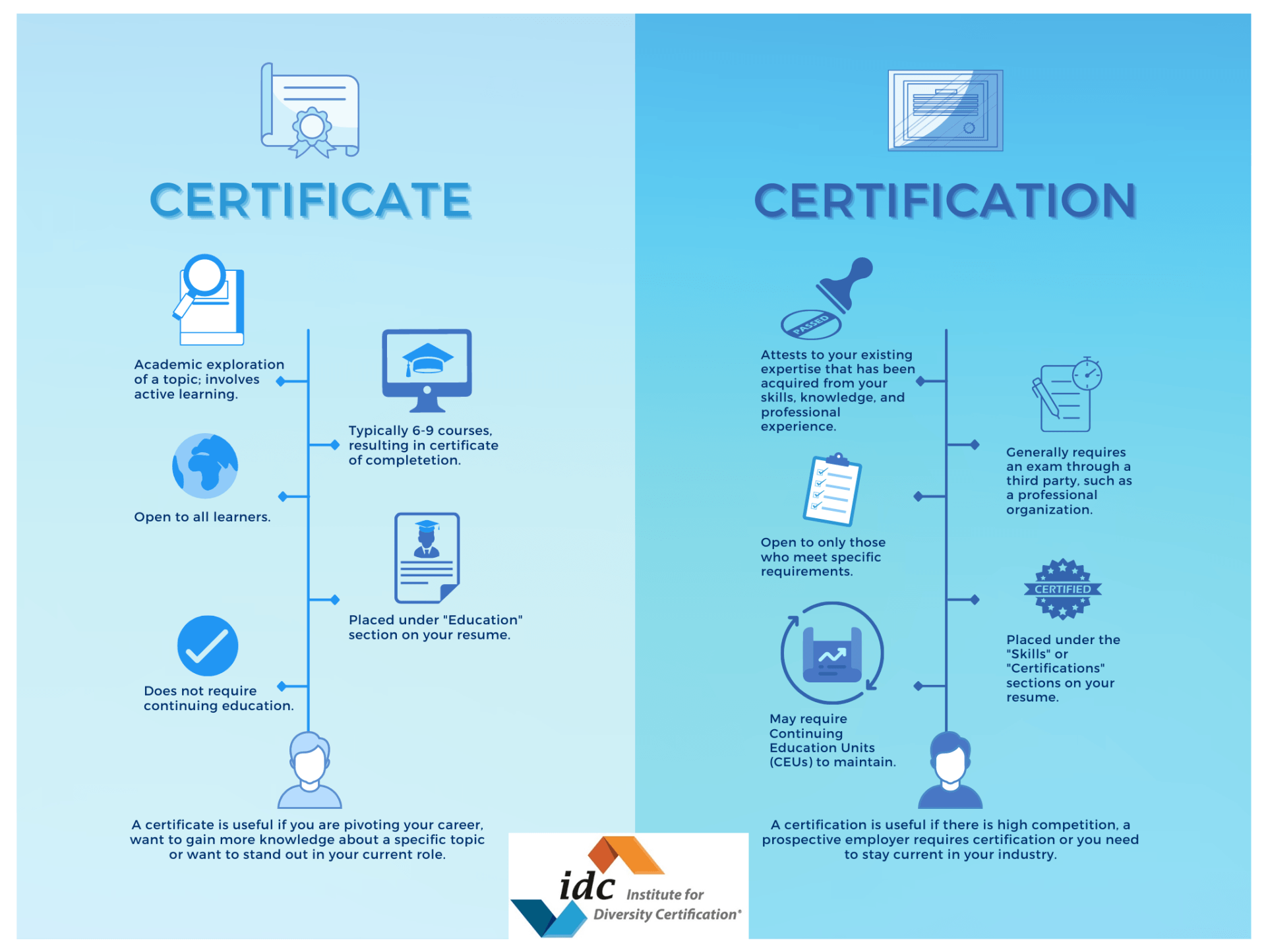A Proven Process for Inclusive Excellence
Certificate Versus Certification
Certification indicates robust knowledge, high performance, and the ability to achieve results.
In today's competitive job market, it's more important than ever to have the skills and credentials that employers look for. A certificate course or certification program can be a great way to improve your skills and knowledge while making yourself more marketable to potential employers. Both can be valuable tools for advancing your career, however, there are key differences between the two.
So what are the differences between certificate and certification programs? And which is right for you?
Certificate
A certificate program is a short-term, non-degree course (or series of courses) that provides evidence of education needed to enter the workforce, develop one's skills, and/or explore a career change. Certificates are typically less rigorous and can be completed online or in person. Also, a certificate can be a gateway to a degree or certification program.
Certification
A certification program results in an industry-recognized qualification credential (e.g., CPA, PMP, SPHR, SHRM-CP) that demonstrates you have the skills and knowledge to perform a job well. Typically offered by professional associations, certification programs often require work experience and a rigorous assessment to demonstrate mastery of a particular industry. Certification also requires continuing education units (or CEUs), indicating ongoing industry proficiency.
What is DEIA Certification?
DEIA Certification is a formal recognition and independent verification of your professional competence, knowledge, skills, and expertise through the achievement of CDP® and CDE® credentials. Both professional qualification credentials are industry-recognized and globally-renowned symbols of excellence in Diversity, Equity, Inclusion, and Accessibility. To earn one of these elite DEI certifications, you must have related experience; pass a high-stakes multiple choice exam; and submit a professional work for peer review. Upon certification completion, CDP® and CDE® Designees must provide evidence of completing 60 continuing education units every three (3) years and pay a small fee ($50) in order to maintain the credentials.
The CDP® and CDE® credentials signify high quality, advanced performance standards, and confidence for DEI practitioners, employers, and the general public.
Key Differences Between Other Certificates and IDC's Certification
- Rigor: Most diversity and inclusion certificate programs have a quiz. If you do not pass the quiz, you can still complete the program. DEI certification does not operate in that fashion. You must demonstrate mastery of a body of knowledge by passing an assessment with a minimum score. Like other certification programs, IDC's assessment and curriculum were informed by a Job Task Analysis (JTA). This evidence-based process describes the physical actions and cognitive activities required to demonstrate high performance in a DEIA role. Subject matter experts (SMEs) identified the job tasks required for successful performance, and an industry-wide survey validated the data collected from the SME panel.
- Expertise: Subject matter experts may or may not be involved in the certificate course curriculum or class lectures. With certification, DEI SMEs contributed to the exam.
- Accreditation: Certificate programs are not typically accredited. Keep in mind, an educational institution can be accredited but the certificate course may not be. A certificate program must market itself as such, therefore look for the word "certificate." Certification programs possess third-party assurance that it's formally recognized by an accreditation body.
- Employment opportunities: Certificates can help you qualify for entry-level jobs, while certifications help you advance in your career.
- Qualifications: Many students may attend certificate programs, whereas a certification utilizes minimum professional experience standards and mandates continuing education units.
What’s right for you?
The best way to decide which is right for you is to consider your individual needs and goals. If you need a short-term, quick way to gain the skills and knowledge necessary to enter a new field or develop your skills, a certificate course may be a good fit.
If you're looking for a more comprehensive educational experience and a credential that demonstrates your skills to employers or clients, a certification program is the perfect option! Certification programs can help you succeed in your chosen field.
Some additional considerations include, but are not limited to:
- Program reputation: Make sure the certification is offered by a reputable organization. Do your research and choose a program that can accelerate your career and organizational goals. IDC's credentials are recognized in all US states and in 30+ other nations as the gold standard for DEI professionals and advocates.
- Your career goals: What are your short-term and long-term career goals? A certificate provides a one-time learning experience, while certifications typically require continuing education. IDC offers year-round opportunities to engage in lifelong learning.
- Your learning style: Do you learn best in a traditional classroom setting or online? Make sure the program can accommodate your needs. IDC offers self-study options, as well as live online courses to help you prepare for the exam.
Ultimately, the decision of whether to pursue a certificate course or a certification program is a personal one. The best choice for you depends on your individual circumstances.
Positive Outcomes with IDC
As society evolves and changes, so do our communication and learning needs and abilities. When it comes to diversity and inclusion, certification is superior over a certificate. Not only does diversity and inclusion certification include continuing education components to keep your skills sharp, our curriculum and exam are revised regularly to ensure ensure your strategies and interventions create positive outcomes.
Did you know?
- Reputation: IDC is the #1 DEIA certification program in the world. Employers ask for our assistance in finding qualified candidates when new DEI job descriptions are posted.
- Time investment: From registration to the exam, you have one full year to complete the program. Fit certification into a schedule that meets your needs!
- Learning style: IDC offers self-study and virtual exam preparation options, as well as official partners who offer virtual and in-person options.
- Influence: Over two-thirds of CDP® and CDE® designees reported that they received more support in the workplace after earning professional DEI credentials.
Certification provides professional credibility by proving:
- A robust expertise on a wider range of DEI issues
- Qualified to provide qualitative and quantitative insight
- Demonstrated competence to achieve superior results over time
High caliber DEIA work results in consistent and meaningful outcomes. Get started on your certification today!
Contact Us
Institute for Diversity Certification (IDC)®
7230 Arbuckle Commons - Suite 134
Brownsburg, IN 46112
1-800-983-6192


Share On: